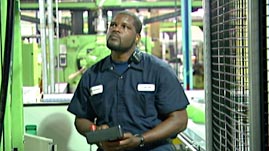Who isn't fascinated by the equipment that produces goods in factories? You’ve seen them—the enormous machines that pump out row after row of candy bars, pencils, or plastic bowls. These machines may never stop running: factories often produce goods 24/7, in part because once you get one of these machines running, it’s hard to turn it off without creating a jam, or some other problem. Even with the machines running all the time, problems do crop up, and that’s where a process maintenance engineer like Tyrone Walker comes in to save the day.
“My degree is in electronic engineering,” he says. “I work on machines known as injection molding machines. These machines make cups and bowls and tumblers and plates, and they run 24 hours a day, seven days a week, and I do my best to make sure these machines stay running.”
Engineering technology is a broad term for the field that forms the backbone of manufacturing and other industries. It’s often divided into smaller, specialized areas and skill sets. Electrical and mechanical engineering technologies create power systems and their components—things like electronic devices, motors, engines, semiconductors, circuits, and computers.
Career options for engineering technicians are as broad as the field itself. Jobs often require math, science, and problem-solving skills in industries like manufacturing, transportation, microelectronics, biotechnology, aerospace, and computer technology. Engineering technicians provide operations, troubleshooting, and other critical information to guide engineering decisions.
The move to electronics engineering was a good one for Tyrone. “I went to several high-tech companies, but they all said, 'you can’t get in here without a degree.' I heard about the community college ATE program through an ad in the newspaper that said, 'Go to college, get a scholarship, and get a job while you learn' and I thought, that sounds fantastic! That’s exactly what I want—I want to go to school.”
“I love my job because of all the opportunities I have,” says Tyrone. “I have opportunities for advancement and to learn things." As a process maintenance engineer, Tyrone feels very successful: "I finally did get to college after 20 years of procrastinating, and finally got my degree and got a great job. But I think there’s more—I want to get to a place in my job where I can say 'Hey, if you need answers come to me and let me teach you.' Then I would consider myself fully successful.”

